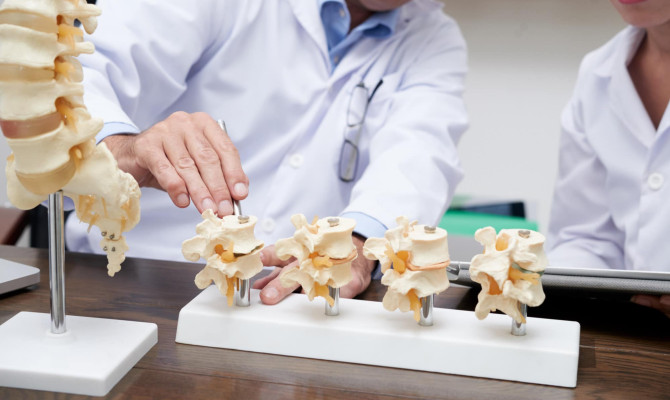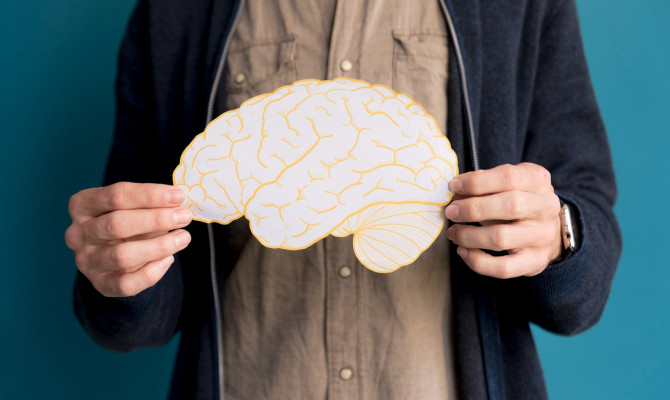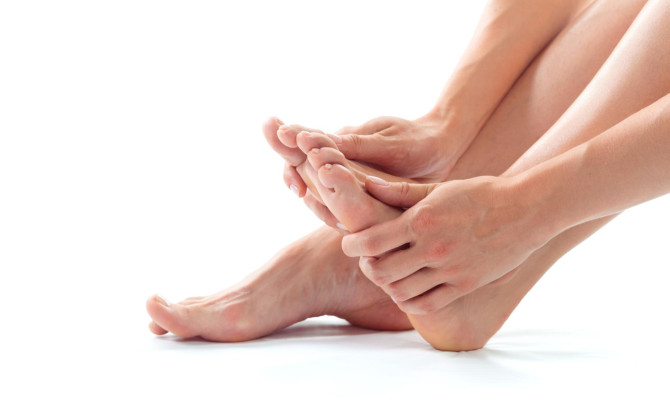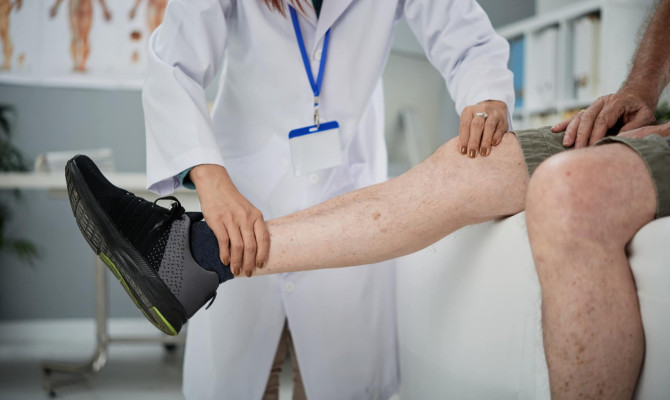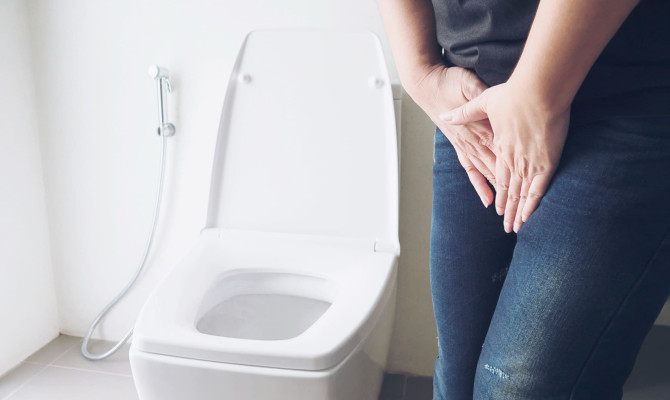What is Meningitis: Symptoms, Types, Transmission and Treatment

- Meningitis
- 22 Aug 2023
Overview
What is Meningitis?
Meningitis is an inflammation of the membranes, which envelop the brain and spinal cord, called the meninges. It is a life-threatening infection and can occur due to bacteria, viruses, fungi, or even non-infectious sources and can have severe consequences. Meningitis can have severe consequences, but early recognition of symptoms, prompt diagnosis, and appropriate treatment can significantly improve the outcome.
This article aims to provide a comprehensive overview of meningitis, covering its symptoms, causes, types, risk factors, diagnosis, treatment, prevention, complications, and prognosis.
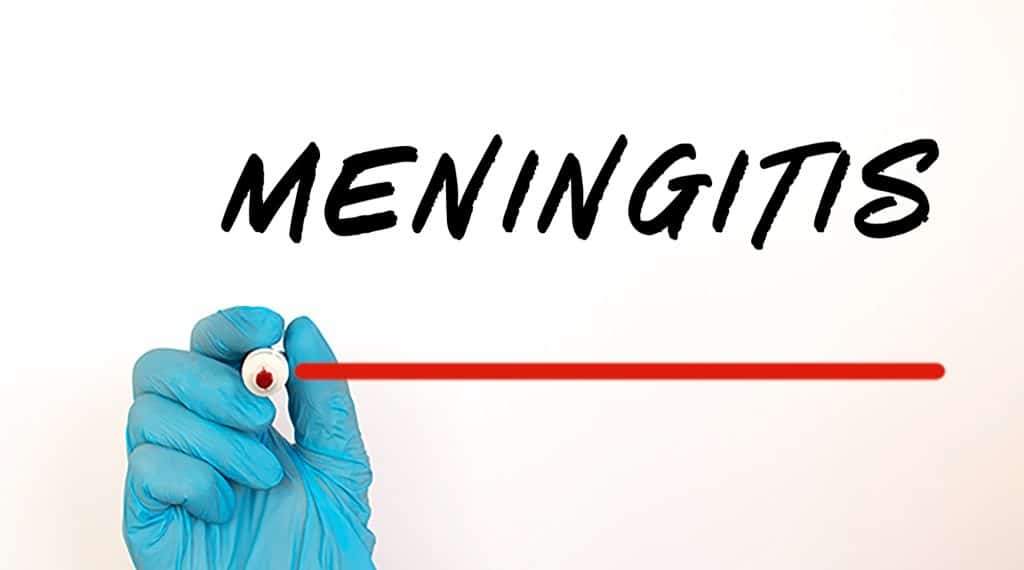
Symptoms
Meningitis Symptoms
Meningitis symptoms can differ depending on the cause of meningitis and the age of the patient affected.
Common symptoms of meningitis may include:
- Neck stiffness1Symptoms| Researched based study from Meningitis.org
- Confusion
- Fever
- Headache
- Altered mental status
- Nausea
- Vomiting
Other signs and symptoms of meningitis in adults and children above two years may include:
- Irritability
- Lethargy
- Neck pain
- Appetite loss
- Dizziness
- Seizures 1Symptoms| Researched based study from Meningitis.org
- Disorientation
- Sensitivity to light (photophobia)
Bacterial meningitis may quickly lead to bloodstream infections known as septicemia and produce the following symptoms:
- Rapid breathing
- Joint pain
- Diarrhea
- Muscle pains
- Cold hands and feet
- Dark purple-red rash 2Symptoms| Researched based study from WHO.int
Signs of meningitis in infants and newborns:
- High fever
- Vomiting
- Poor feeding
- Constant crying
- Bulging spot on the head of the baby 3Symptoms| Researched based study from Stanfordschildren.org
- Trouble waking from sleep
- High-pitched cry
- Stiff or floppy body
- Inactive and sluggish
- Being very sleepy
- Arching back
Types
Types of Meningitis
Based on the cause, meningitis can be of different types, namely:
- Bacterial
- Viral
- Fungal
- Parasitic
- Amebic
- Non-infectious
Bacterial meningitis
- It is fatal, and some patients with bacterial meningitis pass away in as short as a few hours.
- And the majority of patients who recover from bacterial meningitis may have lifelong impairments like hearing loss, brain damage, etc.4Types| Researched based study from Cdc.gov
Viral meningitis
- It is the most common type that mostly affects people with weakened immune systems.
- It is less dangerous when compared to bacterial meningitis.
Fungal meningitis
- It occurs when the fungal infection spreads to the brain or spinal cord from a different body part.
- It is rare and affects people who have specific medical disorders, such as diabetes, HIV, or cancer, that weaken the immune system.
Parasitic meningitis
- Numerous parasites can lead to meningitis and are substantially less frequent than bacterial or viral types.
Amebic meningitis
- An extremely uncommon but deadly infection.4Types| Researched based study from Cdc.gov
- The ameba enters the brain through the nose and causes swelling and tissue damage to the brain.
Non-infectious meningitis
- This type of meningitis does not spread among people.
Causes
Meningitis causes
Causes of meningitis may include:
- Infectious diseases
- Non-infectious conditions
Infectious diseases
Infectious causes of meningitis are:
- Viruses
- Bacteria
- Fungi
- Parasite
- Ameba
Causes of viral meningitis may include:
- Non-polio enterovirus. (Most common)
- Measles virus
- Herpes simplex virus
- Mumps virus
- Epstein-Barr virus
- Influenza virus5Causes| Researched based study from Cdc.gov
- Arboviruses like West Nile virus
- Varicella-zoster virus
- Lymphocytic choriomeningitis virus
Bacterial infections that may cause meningitis include:
- Neisseria meningitidis
- Escherichia coli 6Causes| Researched based study from Cdc.gov
- Mycobacterium tuberculosis (Less common)
- Group B Streptococcus
- Homophiles influenzae
- Streptococcus pneumoniae
Some causes of fungal meningitis include
- Cryptococcus
- Blastomyces
- Histoplasma
- Candida 7Causes| Researched based study from Cdc.gov
- Coccidiosis’s
Parasites that can cause meningitis may include
- Angiostrongylus cantonensis
- Gnathostoma spinigerum 8Causes| Researched based study from Cdc.gov
- Baylisascaris procyonis
Amebic meningitis is caused by
- Naegleria fowleri 9Causes| Researched based study from Cdc.gov
Non-infectious meningitis can be due to
- Cancer
- Certain medicines like NSAIDs and antibiotics
- Systemic lupus erythematosus (Lupus)
- Brain surgery10Causes| Researched based study from Cdc.gov
- Head injury
Transmission
How do microorganisms that cause Meningitis enter the body?
Meningitis is not contagious, but the pathogens causing it, like viruses and bacteria, can spread among individuals.
Through the following ways, a person can contract meningitis-causing pathogens :
- From a mother to a child around the time of birth. (Example – Group B Streptococcus)
- Respiratory droplets or throat secretions.
- Direct or sexual contact. (Example – Herpes simplex viruses)
- Consuming contaminated food or water. 11Transmission| Researched based study from Clevelandclinic.org
- Swimming in unsafe or contaminated water. (Example – Naegleria fowleri)
- Breathing in fungal spores from the environment.
Risk
People at risk
The following individuals have an increased likelihood of developing meningitis:
- People with long-term medical conditions like kidney failure, diabetes, adrenal insufficiency, cystic fibrosis, etc.
- Newborns, infants, and older adults.
- Anyone who has not completed their recommended childhood or adult vaccination schedule.
- Individuals with weakened immunity, like organ transplant receivers, have their spleen removed and have HIV infection, among others.12Risk| Researched based study from Nlm.nih.gov
- Those living in crowded dormitories, boarding schools, military camps, etc.
- People are traveling to endemic areas.
- Microbiologists who get exposed to meningitis-causing bacteria at the laboratory.
- Those who are exposed to vectors like mosquitoes, ticks, etc.
- People who are addicted to alcohol.
- Individuals are under certain medicines like immunosuppressants.
- Those who use IV drugs.
- Pregnant women.
- Cancer patients.
Diagnosis
Diagnosis of Meningitis
Diagnosing meningitis involves a combination of a detailed medical history, clinical examination, and a few diagnostic tests.
A healthcare provider may perform the following:
- Blood tests – to look for meningitis-causing pathogens under a microscope.
- Imaging studies – like CT or MRI scans of the head.
- Lumbar puncture – to collect cerebrospinal fluid (CSF) samples for determining the presence of viruses, bacteria, or other abnormalities.13Diagnosis| Researched based study from Mayoclinic.org
Treatment
Meningitis Treatment
Meningitis requires prompt medical attention, and most patients need hospitalization and close monitoring till their conditions improve.
- Bacterial meningitis is an emergency requiring treatment with antibiotics given through the vein (IV). Sometimes corticosteroids may also be given to reduce the risk of complications like seizures.14Treatment| Researched based study from Healthdirect.gov
- Viral meningitis is typically managed with supportive care, like fluids, over-the-counter pain relievers, and rest.
- Oral or intravenous antifungal medications may be given for fungal meningitis.
Prevention
Meningitis prevention
Several preventive measures can help reduce the risk of meningitis and may include:
- Meningococcal and pneumococcal meningitis are two bacterial meningitis forms that can be prevented by vaccination.15Prevention| Researched based study from Betterhealth.vic.gov.au
- Regularly washing your hands can help stop the transmission of infectious pathogens by practicing excellent hygiene.
- Additionally, it’s crucial to keep your distance from somebody with meningococcal or respiratory infections.
Complications
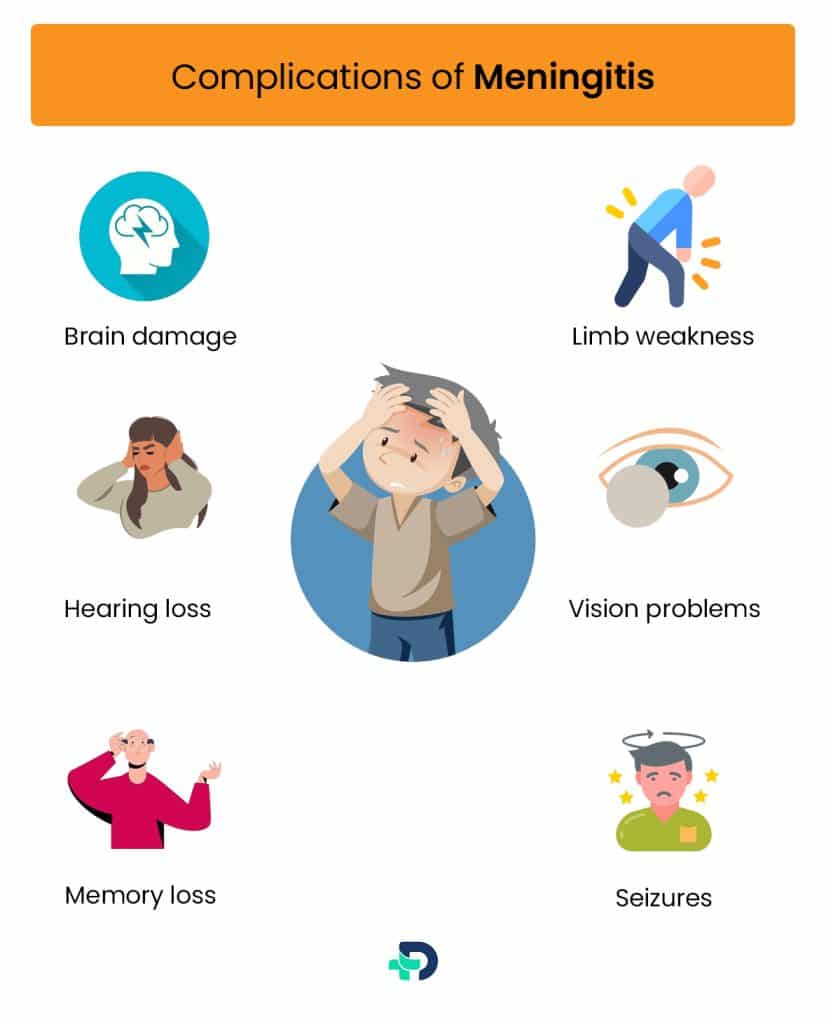
Complications
Meningitis can result in several complications, including:
- Fluid buildup inside the skull 16Complications| Researched based study from Medlineplus.gov
- Brain damage
- Limb weakness
- Hearing loss
- Speech problems
- Vision problems
- Memory loss
- Learning disabilities
- Seizures
- Sepsis (2)
- Death
Prognosis
Prognosis of Meningitis
The prognosis for meningitis depends on several factors, including the underlying cause, the age and overall health of the affected individual, the promptness of diagnosis, and the initiation of appropriate treatment. Long-term effects and complications may still occur even after successful treatment. To control and reduce these consequences, rehabilitation, and aftercare may be required. By raising awareness, promoting preventive measures, and ensuring early medical intervention, we can minimize meningitis’s impact and safeguard the well-being of at-risk individuals.
Any feedback on this article?
 This Articles content was accurate
This Articles content was accurate Very Informative Article
Very Informative Article I have a question or a comment
I have a question or a comment
 This article contains inaccurate content
This article contains inaccurate content This article was not helpful
This article was not helpful I have a question or a comment
I have a question or a comment
We appreciate your helpful feedback!
Checkout our social pages
References
-
Meningitis Research Foundation
Meningitis and septicaemia symptoms | Symptoms
-
World Health Organization
Meningitis | Symptoms
-
STANFORD MEDICINE CHILDREN'S HEALTH
Meningitis in Children | Symptoms
-
Centers for Disease Control and Prevention
Meningitis | Types | Causes
-
Centers for Disease Control and Prevention
Viral Meningitis | Causes
-
Centers for Disease Control and Prevention
Bacterial Meningitis | Causes
-
Centers for Disease Control and Prevention
Fungal Meningitis | Causes
-
Centers for Disease Control and Prevention
Parasitic Meningitis | Causes
-
Centers for Disease Control and Prevention
Amebic Meningitis | Causes
-
Centers for Disease Control and Prevention
Non-Infectious Meningitis | Causes
-
Cleveland Clinic
Meningitis | Transmission
-
National Library of Medicine
Meningitis | Risk
-
Mayo Clinic
Meningitis | Diagnosis
-
Health Direct
Meningitis | Treatment
-
Better Health Channel
Meningitis | Prevention
-
Medline Plus
Meningitis | Complications












